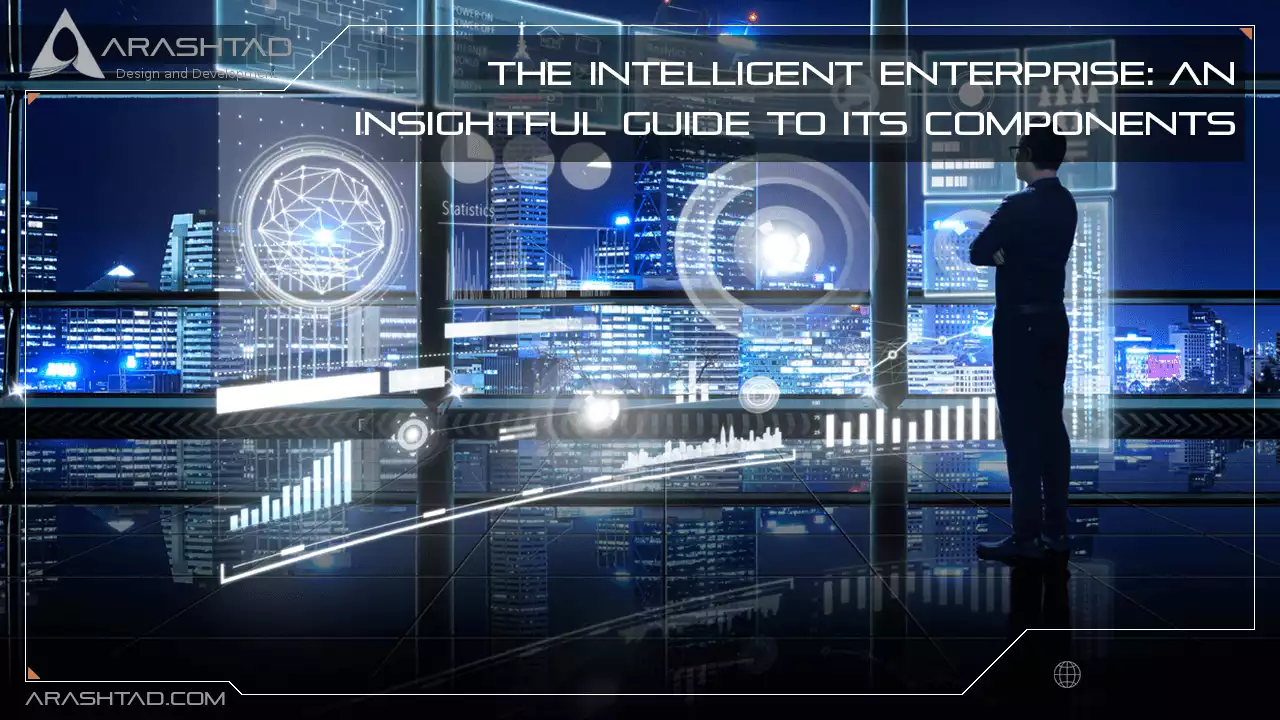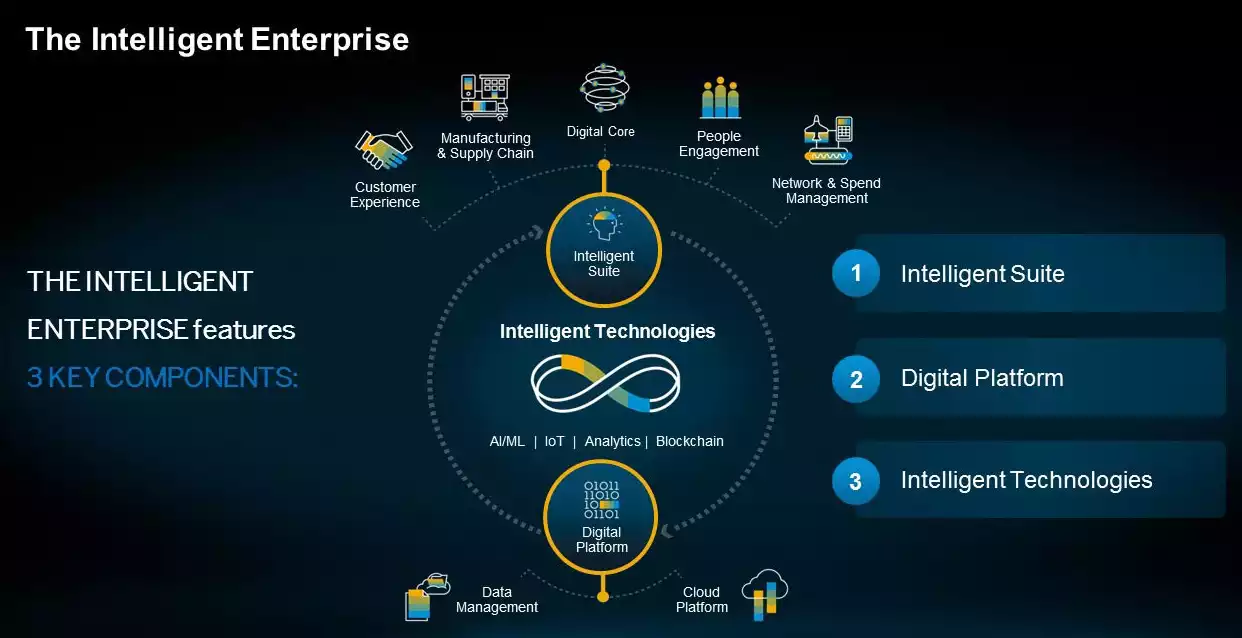The Intelligent Enterprise: An Insightful Guide to Its Components and Capabilities
A sophisticated organization applies advanced technologies and best practices to agile, integrated business processes to achieve success. The core processing components, as part of the enterprise platform, improve the automation process of the business. To achieve optimal results, it optimizes data processing. Business intelligence is the collection, storage, and analysis of data generated by business operations to provide a comprehensive picture of a company. This article introduced you to the Capabilities, Components, and Applications of Intelligent Enterprise Platforms.
Intelligent Enterprise introduction
It’s two different words, but they mean a lot when used collaboratively. In computer science, intelligence refers to a machine or computer capable of processing and computing, while enterprise refers to a company or an organization. In other words, an intelligent enterprise is a business that has its own computing and processing solutions, which can be used to accomplish tasks faster and with less risk. With an intelligent enterprise platform, you can apply technology and new service examples to the challenge of improving the performance of an organization or enterprise.Capabilities of Intelligent Enterprise Platforms
Intelligent Enterprise Platforms can provide three types of capabilities, and these three capabilities offer three types of outcomes, as follows:1- Visibility:
Intelligent enterprises provide greater visibility. They can collect and connect information previously isolated from each other, so patterns can be discovered that were previously hidden.2- Focus:
The intelligent enterprise not only provides visibility but also focuses, i.e., replicates the potential impact of the possible options and directs the scarce resources to areas that will have the maximum impact.3- Agility:
An intelligent enterprise can respond rapidly to market and business changes and turn the business processes in the right direction for customers.Intelligent Enterprise Platform components
The Intelligent Enterprise consists of three essential components:1- Intelligent Suite:
These applications provide an SAP cloud platform and analytics cloud platform, and they are made up of intelligent applications such as customer experience, network management, speed management, and digital core for every line of business. Its main advantage is that it’s modular and easy to use and consume.2- Digital Platform:
As well as offering high-performance data warehousing and various analysis capabilities, it provides a uniform digital layer to capture real-time value from different data types on the cloud platform.3- Intelligent Technologies:
Several new intelligent technologies are involved, including machine learning, the internet of things, artificial intelligence, and blockchain. These technologies allow customers to complete tasks more quickly and with fewer risks.Creating an Intelligent Enterprise
Creating an intelligent enterprise involves using cognitive, prescriptive, predictive, and descriptive analytics.1- Cognitive Analytics:
As part of this technique, human-like intelligence is applied to a particular task, such as understanding the context of what is being said or written as well as the words in that message. The technology combines artificial intelligence algorithms, cognitive computing, deep learning, and machine learning with other intelligent technologies.2- Prescriptive Analytics:
We can use it to find the best actions for a given situation. We can also use it to prescribe proper recommendations. In addition, it can be used to combine several intelligent techniques, such as neural networks, deep learning, and machine learning algorithms.3- Descriptive Analytics:
In general, this provides a small glimpse into business performance. For example, we can see how much revenue an organization generated, how much sales it generated, and a lot more for an organization. This raises the question of what will happen next. This can be achieved through predictive analytics.4- Predictive Analytics:
It predicts what will happen next based on past experience. As the name suggests, it will let us know what will happen next. Despite this being a fascinating development, It will be able to answer questions such as which product a customer will buy next or which will fail with several techniques in data science, clustering, classification, and regression.Applications of Intelligent Enterprise Platforms
In intelligent enterprise, the growth of a car manufacturing company can be increased. One of the best examples of intelligent enterprise can be attributed to implementing an intelligent enterprise in several business sectors. For example, suppose someone takes a picture of a car and likes it a lot, so he posts it on Instagram or Twitter and comments excellently. With the help of several new intelligent technologies like machine learning and artificial intelligence, the car manufacturer was notified that someone had posted a photo of their car. Therefore, the company will notify that individual that if he or she is interested in purchasing a new car, then if he or she wishes to buy it, he or she will contact the dealer. In this way, an intelligent enterprise can contribute to a company’s growth.It would be possible to add another feature to this by allowing the user who posted the photo to select the colors and other features of that product with the help of augmented reality, which would help him to choose the right product. The company can increase its profits by using intelligent enterprise (intelligent technologies). Other applications of Intelligent Enterprise include banking and finance, travel and hospitality, healthcare, transportation and logistics, media and entertainment, education, and many others.
Banking and Financials
Among the many roles Intelligent Enterprises play in banking and financials, they include fraud prevention, risk management, and fraud detection. It can also tell us how to recover from those risks. It also provides feedback and sentiment analysis, i.e., positive, negative, or neutral feedback. Analyzing the feedback given by the customer provides an accurate picture of the market.Education
An intelligent enterprise plays a crucial role in education as well, as it can provide remote education to students on a large scale by using several intelligent technologies. The learning process involves adaptive learning that includes a commutative as well as a productive environment.Healthcare
As a result of various intelligent technologies, such as machine learning, the internet of things, artificial intelligence, and so on, any healthcare enterprise can quickly grow up with multiple products. For instance, machine learning and neural networks can be used to create a skin disease detection app that can tell us the patient’s condition, which will lead to business growth.Logistics and Transportation
There are three sectors of transportation: roadways, railways, and marine transport. Several features like dynamic pricing and traffic management can be helpful regarding roadways. Currently, numerous companies, including OLA and UBER, widely use dynamic pricing and raise their prices when high traffic or when a lot of demand arises.Media and Entertainment
A media player application, for instance, involves various things, such as cyberattacks, video and social media analytics, data journalism, and many others. With the help of artificial intelligence, the company can develop a playlist of songs that the user wants to listen to based on his previous searches and previous listening.Travel and Hospitality
In the same way as the media and entertainment, the travel and hospitality apps will show people what they are looking for based on previous searches. Using several intelligent technologies, we can create conversational UI chatbots, and the user will ask the chatbot his questions, and the chatbot will provide the results based on the data it contains. We can create intelligent rooms for customers through the internet of things, which will benefit the organization.Insurance
Due to digitization, insurance companies have also started using new technologies to achieve their business targets. They can collect data and information about customers through various techniques.Conclusion
There is a rapid rise in artificial intelligence, machine learning, IoT, advanced analytics, and blockchain technologies. Intelligent technologies, such as the internet of things (IoT), artificial intelligence, and machine learning, can help businesses adapt to the new world faster, improve their business processes, and help them meet changing demands more easily. Through real-time reports, companies are making strategic decisions and making sense of data faster, putting them ahead of the intelligent enterprise journey. An intelligent enterprise requires focus and agility to manage change, improve productivity, redefine the customer experience and transform workforce participation. Using the latest technologies, intelligent enterprises turn insight into action across the organization – in real-time. As a result, they accelerate data-driven disruption and process automation, launch new business models, provide exceptional experiences, and more.Download this Article in PDF format

Arashtad Custom Services
In Arashtad, we have gathered a professional team of developers who are working in fields such as 3D websites, 3D games, metaverses, and other types of WebGL and 3D applications as well as blockchain development.


